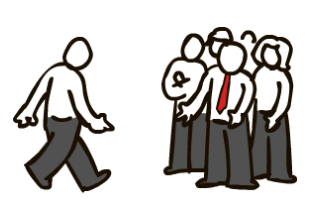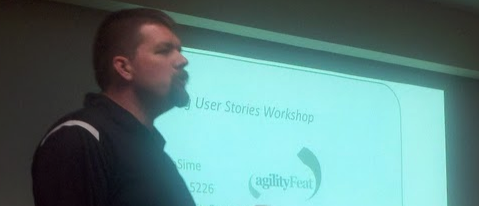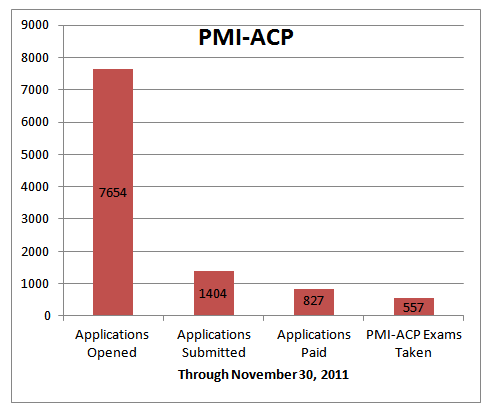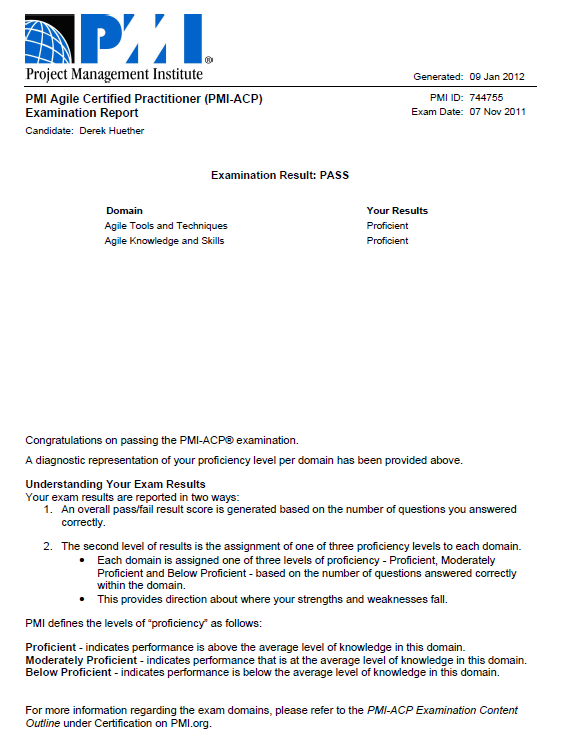 Today I saw a link on Twitter that intrigued me. It was a video of WikiSpeed's Joe Justice at TEDxRainier. Sure, the video is 10 minutes long. But, I guarantee it will leave you inspired. I get challenged all the time by people saying Agile is only good for Software Development. Well, watch this video and see if you don't agree that the horizon has expanded. If you don't want to click the link above, I'm adding an embedded video below.
Today I saw a link on Twitter that intrigued me. It was a video of WikiSpeed's Joe Justice at TEDxRainier. Sure, the video is 10 minutes long. But, I guarantee it will leave you inspired. I get challenged all the time by people saying Agile is only good for Software Development. Well, watch this video and see if you don't agree that the horizon has expanded. If you don't want to click the link above, I'm adding an embedded video below.
PMI Agile CoP Transparency
 Back in December, the PMI Agile Community of Practice (CoP) leadership agreed we'd take steps to provide some transparency into what we are doing. If you are curious about what we're up to, I invite you to follow the link below.
Here is the link to our board. https://pmiagilecop.
Back in December, the PMI Agile Community of Practice (CoP) leadership agreed we'd take steps to provide some transparency into what we are doing. If you are curious about what we're up to, I invite you to follow the link below.
Here is the link to our board. https://pmiagilecop.
Anyone can access this Kanban (read only): Username: AgileCOP@gmail.com Password: GoAgile
What do you think? Is this enough transparency?
Image Source: Pictofigo
PMI-ACP Proficiency
How to Help PMI Chapters & Members
 After speaking with a few PMI Chapters, I see them (at least the ones I spoke to) suffering from one major issue. How to they grow their membership?
After speaking with a few PMI Chapters, I see them (at least the ones I spoke to) suffering from one major issue. How to they grow their membership?
Membership
Because PMI has created an ecosystem where people pay serious money to prepare for certification exams and then continue to pay good money for Professional Development Units (PDU)s to maintain those certifications, why don't the Chapters capitalize on that? The PMI Chapter is much more than a monthly opportunity to exchange business cards. They are a conduit to continued education.
PMI Chapters are trying to provide value to and grow their memberships. If the membership drops too low, clearly there can be a problem. With the average annual dues for a PMI Chapter (in the United States) at $25, what value can they provide as an incentive to join the Chapter? Additionally, without collecting enough membership dues, PMI Chapters have to find other forms of revenue to sustain themselves.
I believe the solution to growing PMI Chapter membership (or PMI membership) is to make it more cost effective to be a member (of both) than it is to be a n0n-member pursuing or maintaining a PMI credential. PMI and PMI Chapters should adopt the old American Express slogan membership has its privileges.
Idea 1:
The cost for PMI membership is $129 to join and $119 to renew (annually). The cost for annual PMI Chapter membership averages $25. PMI should require all Registered Education Providers (REP) to extend a discount to exam preparation training by more than $150 to PMI Chapter members. Right there, the membership has paid for itself. On top of that, they should discount single PDU offerings by at least 10%.
Idea 2:
REPs should profit share with the PMI Chapters. I see PMI Chapters selling advertising to training providers. That model doesn't really scale. Training providers are paying for advertising in the hope there will be revenue generated to justify the cost. This caps the revenue the Chapter can make and provides no guarantee to the training vendor that the investment is worth while. Why don't the Chapters just ask for a percentage of revenue with the agreement to distribute the training option to their membership? It's a win-win agreement.
Idea 3:
PMI Chapters should make deals with authors and suppliers, to offer the same type of profit sharing model. Think of Amazon affiliate links. It costs you nothing to promote these products but if people trust your recommendation, you could potentially create revenue. The same goes for the PMI Chapters. If their membership trusts them, they could provide them discounts on products and services AND get a referral fee.
Summary:
Again, remember the old slogan for American Express. Membership has its privileges. It doesn't matter if you are a member of PMI, The Scrum Alliance, or Agile Leadership Network. Membership SHOULD also provide discounts.
Or course I want to put my money where my mouth is. My PMI-ACP 3-day workshop is $1495. If a PMI Chapter member wants to take my class, they need only to identify the chapter they are a member of and I'll discount the cost of the workshop to $1250. That will save them $245. Additionally, I'll send $150 to the PMI Chapter they belong to. If interested, just contact me.
Image Source: Pictofigo
ALN Arin Sime and User Stories
 A quick thank you to Arin Sime and the local Agile Leadership Network chapter for an excellent workshop. Tonight, Arin Sime of AgilityFeat facilitated a workshop on User Story splitting. What I felt was compelling was not the discussion about the best size of a user story, what INVEST was, or even the best way to write a user story. What I liked the most about the workshop was Arin's purposeful misdirection early on, having us write bad user stories. That's right. Arin gave us instructions and had us write bad user stories by way of anti-patterns. In software engineering, an anti-pattern is a pattern that may be commonly used but is ineffective and/or counterproductive in practice. Sometimes it's hard to write really good user stories. Knowing if it's a good story usually falls under IKIWISI (I'll know it when I see it), though people can commonly write really bad user stories and think they are great. I'm not going to go into detail about what makes a "good" user story. I'm about to turn into a pumpkin and I wanted to get this post out within hours of the event.
If you get a chance, look up Arin and look up Agile Leadership Network. Either way, you're going to walk away with something of value.
A quick thank you to Arin Sime and the local Agile Leadership Network chapter for an excellent workshop. Tonight, Arin Sime of AgilityFeat facilitated a workshop on User Story splitting. What I felt was compelling was not the discussion about the best size of a user story, what INVEST was, or even the best way to write a user story. What I liked the most about the workshop was Arin's purposeful misdirection early on, having us write bad user stories. That's right. Arin gave us instructions and had us write bad user stories by way of anti-patterns. In software engineering, an anti-pattern is a pattern that may be commonly used but is ineffective and/or counterproductive in practice. Sometimes it's hard to write really good user stories. Knowing if it's a good story usually falls under IKIWISI (I'll know it when I see it), though people can commonly write really bad user stories and think they are great. I'm not going to go into detail about what makes a "good" user story. I'm about to turn into a pumpkin and I wanted to get this post out within hours of the event.
If you get a chance, look up Arin and look up Agile Leadership Network. Either way, you're going to walk away with something of value.
Image Source: My really sad Droid X
How to Claim PMP PDUs as a Non-PMI Member
Claiming PDU
How would I claim PDUs if I'm not a PMI member? This question keeps coming up in conversation. I offer the hypothetical situation where someone sees value in the new PMI-ACP certification but is hesitant to become a member of PMI. I guess it would be complete fantasy if not for the fact there are about 100,000 more PMI credential holders than PMI members*. PMI reported as of November 2011, there were 370,744 PMI members and 469,051 PMPs. Add the CAPM, PMI-RMP, PMI-SP, and PgMP and I think we get to our 100,000.
100,000 people realized you don't need to be a member of PMI to maintain a PMI credential, particularly the PMP. They save a $119 membership renewal fee in exchange for being charged more for PMI events and products or not having access to the Communities of Practices. Granted, if they aren't really engaged in the Project Management or Agile community, maybe it's worth saving the $10. For the record, I think being a member of the PMI Agile Community of Practice is worth the cost of membership. Seriously, it's only $10 a month! But I digress.
The focus of this post is for those 100,000. The key to claiming PDUs is having a PMI.org account. Yes, the glue that holds this all together is a free account, not a paid membership. Your potential membership and credentials will be linked to this account.
If you're applying "project management" educational credit toward exam eligibility, there is a different way to claim those hours. For example, if you take my PMI-ACP class, you can apply 21 PDUs toward any of the current PMI credentials and also apply 21 contact hours toward ACP eligibility.
But you still don't need to have a paid membership.
*Source: December 2011 issue of PMI Today
The Agile Mindset
 As I look back at the last year, I am amazed at how much has changed in my life. I left my position advising the Federal Government for something that aligned closer to what I felt inside my heart and mind. I didn't want to "do" Agile. I wanted to "be" Agile. There is a profound difference. Doing Agile is what you do externally. Being Agile is what's on the inside. Being Agile is defined by your values, guiding principles, and mindset.
As I look back at the last year, I am amazed at how much has changed in my life. I left my position advising the Federal Government for something that aligned closer to what I felt inside my heart and mind. I didn't want to "do" Agile. I wanted to "be" Agile. There is a profound difference. Doing Agile is what you do externally. Being Agile is what's on the inside. Being Agile is defined by your values, guiding principles, and mindset.
Agilists tend to have very different ideas and attitudes in which we approach a situation, especially when the situation is seen as being difficult to alter. We fall into that group of innovators, technology enthusiasts, early adopters, and visionaries.
A colleague and I just completely an Agile assessment, where we interviewed over 60 people in an organization. When we told them we were hired to shepherd them through an Agile transformation, the responses were pretty consistent. They pretty much all agreed there was a need for a cultural shift within their organization. They needed to begin leaning toward an Agile mindset.
I'm excited to see the benefits they will realize by doing Agile. But, I'm even more excited to see what is possible, if they start being Agile.
Image Source: Pictofigo
PMI-ACP Numbers
 As we get closer to the announcement of how many people passed the v1.0 version of the PMI-ACP exam, I want to congratulate everyone who participated in the process. Regardless of how you did, you're an early adopter and should be commended on your efforts. You helped make the exam better for others.
As we get closer to the announcement of how many people passed the v1.0 version of the PMI-ACP exam, I want to congratulate everyone who participated in the process. Regardless of how you did, you're an early adopter and should be commended on your efforts. You helped make the exam better for others.
Last week while we were in Miami, the baton has been passed from the steering committee to the new ACP Support team. As co-lead of the team, I look forward to future learners taking the v1.1 on Janauary 31 and v1.2 at the end of 2nd quarter.
I'll post other information about the PMI-ACP Support team at a later date.
Data Source: PMI Agile CoP Strategic Planning meeting


